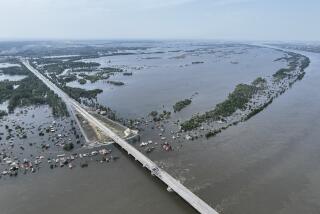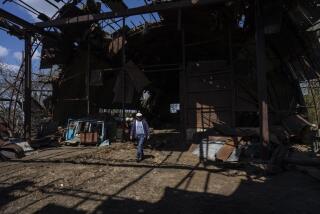Russian Cast Adrift Clings to Hope of Rescue
- Share via
MOSCOW — For a lone Russian merchant seaman, drifting rudderless in a barge for 20 days among the ice floes near the Arctic Circle, all hope of survival is being blown away by winds so strong a man can barely stand up in them.
A violent storm ripped Ivan Shchur’s 82-foot barge from its moorings in the port of Enurmino, above the Arctic Circle, on Oct. 28. Nearly three weeks later, rescuers have only a vague idea of his whereabouts, but even if they had the equipment to pinpoint his location, they are grounded by blinding snow, fog and fierce winds.
For Shchur, 34, the weather isn’t the only enemy. The other is time. He has enough fuel to run his motor for about 10 more hours--and the motor is his lifeline, enabling him to operate his radio, connect to rescuers and heat his cabin in the bone-chilling cold.
“He will have to use his fuel very sparingly,” Col. Mikhail Zivilyov, head of the Chukotka Civil Defense and Emergency Situations Department on Russia’s remote northeastern tip, said by phone. “We are superstitious people, and we do not even want to guess how long the fuel may last. We just hope for the best, and we’ll try to do everything we can to rescue the poor guy.
“The forecasters say that the storm will last another three days at least, which will aggravate the situation even further and put Ivan’s life on the very brink.”
Despite this bleak scenario, Zivilyov said Shchur sounded chipper when he made his daily radio call Thursday.
“Ivan is holding up like a real man, a real Russian man,” said Yuri Kampanyenets, deputy head of the administration in Shchur’s hometown of Mys Shmidta, 240 miles west of where he was set adrift. “He does not lose heart. Of course, he is cold and scared, but when he talks to the Emergency Ministry officers on the radio he tries not to show his fear.”
The only other occupant of the barge, called the Meridian, was ashore when the storm tore it from its moorings and broke its rudder.
Since then, Shchur has drifted 280 miles south around Dezhnyov Cape in Russia’s far northeast to a point near Itygran Island in the Senyavin Strait, in the Bering Sea, where he is believed to be now. Heartbreakingly, he is in sight of the shore but has no way of getting to it or of knowing where he is.
“We think that he is there [near Itygran Island], but no one has actually seen him there,” Zivilyov said. “So it’s possible that he is in a totally different place.”
Like the Kursk submarine rescue disaster in miniature, Shchur’s predicament once again highlights Russia’s ill-equipped rescue services. But unlike the Kursk disaster, when Russia was reluctant to ask for help, the U.S. rescue service in Alaska is involved in the search, trying to provide bearings for Shchur’s location.
Another difference from the sinking of the nuclear submarine is that this time around, the nation isn’t holding its breath over his fate, as he sloshes, all but forgotten, among the ice.
Waiting, desperate for news, in Mys Shmidta are his twin brother, Sergei, and a sister, Tamara, 28. The three, raised in an orphanage in Kazakhstan after their parents deserted them, are devoted to one another and share a two-room apartment with frozen pipes and no water or heating.
Sergei Shchur, also a merchant seaman, persuaded his twin to give up a job at the local diesel power plant early this year and go to sea.
“Despite his lack of experience as a sailor, I’m sure nothing bad will happen to him. He’s so strong in spirit that I am not afraid for him,” Sergei Shchur said, also interviewed by phone. “We have been through many tough times before. The orphanage and life in Chukotka taught us a lot about survival.”
Tamara Shchur said Ivan’s predicament “would break any other person but not my Vanya. His whole life has been a difficult situation from the very beginning. And that made him and Sergei real men whom nothing can break.”
Conditions for Ivan Shchur are extremely hostile.
“The weather is as bad as it can get,” Zivilyov said. “The wind is 30 to 35 meters per second [about 75 mph]. For those who have never felt a wind that strong, it is impossible to imagine what it is like. In simple terms, it means that an average grown-up cannot even stand upright: He will literally be blown off or knocked down. What rescue operation can we speak of in conditions like this?”
The ice in the sea also complicates the rescue, with shipping above the Arctic Circle suspended and only one ship available farther south, the Lider coal ship, which had to flee the storm and has sheltered in the port of Provideniya in recent days.
“There are only parts of the sea not covered in ice,” Zivilyov said. “Ice drifts freely along these paths, and Ivan’s barge drifted along one of them too.”
In 20 days, there have been only four when the weather was good enough to send out rescue helicopters. But the choppers, not equipped with radar, had to rely on readings made before takeoff by Russian border guards and the FSB, the main successor to the KGB.
By the time they flew to the area, Shchur had drifted away.
On Monday, Shchur heard a helicopter as it flew directly overhead, but the pilots couldn’t see him because of fog.
Kampanyenets said the local rescue services lacked the equipment for a proper rescue effort. “You cannot expect them to work miracles with the gear they have got,” he said. “It is sad, but that’s the reality.”
He said the Shchur twins are tough men, hardened by life in northern Russia.
“For people from the north, hope is the last thing they lose. That’s why guys like Ivan will fight till the very end,” he said. “They never give up. They never cry. They never lose heart.”
Shchur’s siblings cannot talk to him by radio because the rescue center is 450 miles from home. But his sister said, “He knows what I would tell him: I am waiting for you, I love you, and I believe in you.”
*
Alexei Kuznetsov and Sergei L. Loiko of The Times’ Moscow Bureau contributed to this report.
More to Read
Sign up for Essential California
The most important California stories and recommendations in your inbox every morning.
You may occasionally receive promotional content from the Los Angeles Times.













